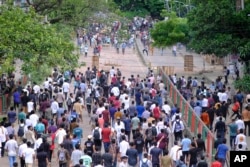Student Union
Lower-Priced Colleges Offer Options to Student Debt
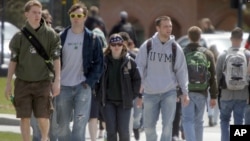
This story was first reported in VOA Learning English.
As tuition and fees have increased sharply in the U.S. over the past 30 years, schools are looking for ways to make college and university more affordable.
Between 1990 and 2012 while college enrollment increased 62 percent, the volume of borrowing for school increased 352 percent, according to the Heritage Foundation. By the end of 2017, according to the Federal Reserve Bank, national student loan debt in the United States was $1.48 trillion.
One popular option is community college. These schools offer a two-year study program that awards an associate’s degree at a cost vastly less expensive than four-year schools. Those credits are typically transferrable to a four-year college or university where a student can achieve a bachelor’s degree.
Some four-year colleges and universities, often public institutions, offer free tuition but ask students to pay for room and board, like housing and food. Books and other school supplies may also be the responsibility of the students, which may add up to an unaffordable package of schools costs from some students.
Some colleges exchange part-time work on campus for lowered tuition and fees.
Berea College in rural Kentucky, does not charge tuition. The school looks for students who would otherwise struggle to pay for college.
“You have to be economically disadvantaged to get in,” Richard Cahill told VOA. He is a history professor and Director of the Center for International Education at Berea.
“We try to take the brightest of economically disadvantaged students to give them a world-class education,” he said.
The college has a history of helping people who have less since 1855. It was started by the Rev. John G. Fee, who opposed slavery. From its beginning, black and white students, male and female, studied together.
Now, there are 1,600 students, and more than 25 percent are black. 7 percent international students from over 70 countries. And "30 foreign students from 3,000 who begin their applications."
Now, there are 1,600 students. Forty percent of Berea College’s student body identifies as a person of color, according to its website and Cahill says nearly 25 percent are African-American, 10 percent are Hispanic and 7 percent international students, representing more than 70 countries.Cahill says every year the school accepts 30 of 3,000 foreign students who compete for admission online. Students work 10 to 20 hours a week on the Berea campus, to pay for room and board and books.
Other four-year colleges where international students can be part of a work program to cover all or part of their tuition include:
· College of the Ozarks — also known as “Hard Work U.” This Christian school near Branson, Missouri, admits a small number of international students. Every student works 15 hours a week, and two 40-hour work weeks a year to cover the cost of tuition.
· Warren Wilson College is a small liberal arts college near Asheville, North Carolina, with just under 700 students. Students work on campus and earn over $2,000 toward tuition. Depending on financial needs, international students may get full-tuition paid by a program called Milepost One, or other scholarships. The campus includes a 300-acre farm where students work and grow food served on campus.
· Barclay College is a smaller school with a few foreign students in rural Haviland, Kansas, a Midwest state. It is a small Christian liberal arts school with only 170 students. Director of Admissions Justin Kendall told VOA they offer free tuition to boost enrollment, and students are responsible for about $16,000 a year for room and board. Donors help make up the difference at the school. Kendall said, “they love the college, and what we’re doing here.” He says foreign students do “really, really well” there because of the small size. “They get a lot of personal attention here.”
· Curtis Institute of Music in Philadelphia offers free tuition. The school “highly values a diverse international student body,” according to its website. Musicians from 20 countries make up nearly 40 percent of the students. The school requires an audition and admits very few students.
Service academies
U.S. military academies –- also called service academies because graduates must serve in the Navy or Marines after graduation -- are technically free and even offer a stipend to students that increases as they rise in grade. The U.S. Military Academy at West Point is the oldest of the military colleges, dating back to 1802. The U.S. Naval Academy (USNA) was founded in 1845 and is known as Annapolis, in Maryland where it is located. The Coast Guard and Air Force academies are younger, established in 1930 in New London, Connecticut, and 1945 in Colorado, respectively.
But admission rates are extremely low, meaning these service academies are highly selective, requiring applicants to show not only excellent grades and test scores, but exemplary community service and recommendations from elected lawmakers.
The service academies offer slots to international students, but they are selected and sponsored by their home country governments, and be between the ages of 17 and 22 to be considered for admission. The countries are selected by the U.S. State Department and Department of Defense. West Point says American embassies ask each invited nation to nominate up to six candidates to compete for admission to the school.
West Point’s website says up to 60 international students may study at the academy at a time. The same is true for the U.S. Air Force Academy and U.S. Naval Academy. The U.S. Coast Guard Academy also admits international students.
West Point spokesman Frank DeMaro Jr. told VOA that the most recent class has students from 14 countries, including Colombia, the Gambia, Jordan, Rwanda and Thailand. After graduation, he says, they return to their countries and serve as officers in their armed forces. Graduates of U.S. service academies are expected to serve in the U.S. Army, Navy, Air Force or Coast Guard on active duty after graduation.
See all News Updates of the Day
Survey: Social integration, career prep are important to international students
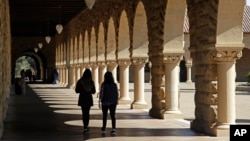
A recent survey of international students in the United States found that before starting school, they were concerned about personal safety, making friends and feeling homesick.
Inside Higher Ed reports that international students want specialized orientations, peer connections, career preparation and job placement to help make their college experiences successful. (July 2024)
US advisory council ends Nigeria visit, signs student exchange deal
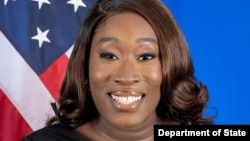
Members of a U.S. presidential advisory council have approved a student exchange deal between an American college and a Nigerian university as part of the council's effort to strengthen collaboration on education, health, entrepreneurship and development between Africa and Africans living abroad.
The council also visited a health facility supported by the United States Agency for International Development in the capital.
Nigerian authorities and visitors chatted with members of the U.S President's Advisory Council on African Diaspora Engagement as they toured a healthcare facility in Karu, a suburb of Abuja, on the last day of the council's three-day visit to Abuja and Lagos.
The facility is one of many supported by the United States Agency for International Development, or USAID, to improve the management of childhood illnesses, family planning, immunization and delivery.
The tour was part of the council's effort to promote African diaspora-led investments in technology entrepreneurship, education and healthcare delivery.
"They're doing a phenomenal job there, it really gave us a sense of what the healthcare system is in Nigeria," said Deniece Laurent-Mantey, executive director of the advisory council. "This is our first trip as a council to the continent and we chose Nigeria for a reason — the diaspora in Nigeria is very active, very influential, and they're really a source of strength when it comes to our U.S.-Africa policy. And so for us coming to Nigeria was very intentional."
The council was created by President Joe Biden in September to improve collaboration between Africa and its diaspora in terms of economic and social development.
Akila Udoji, manager of the Primary Healthcare Centre of Karu, said officials in Nigeria were pleased that the council members were able to visit.
"We're happy that they have seen what the money they have given to us to work with has been used to do, because they have been able to assist us in capacity-building, trainings, equipment supply and the makeover of the facility," Udoji said.
Earlier, the council signed a deal for a student exchange program between Spelman College in the southern U.S. city of Atlanta and Nigeria's University of Lagos.
Laurent-Mantey said education exchanges are one of the council's top priorities.
"In Lagos, we had the president of Spelman College — she's also a member of our council — she signed an agreement with the University of Lagos to further education exchange programs in STEM and creative industries between those two universities," Laurent-Mantey said. "And I think for us it's very important, because Spelman College is a historically Black university, and so here we are promoting the importance of collaboration between African Americans and Africans."
In March, the advisory council adopted its first set of recommendations for the U.S. president, including the student exchange initiative, advocating for more U.S. government support for Africa, climate-focused initiatives, and improving U.S. visa access for Africans.
The council met with Nigerian health and foreign affairs officials during the visit before leaving the country on Wednesday.
American Academy of the Arts College announces closure
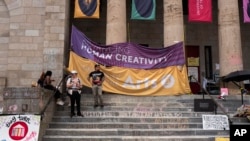
The American Academy of Art College in Chicago announced it would be closing after 101 years of preparing students for careers in art and illustration.
WTTW news reported that like other art colleges, the academy saw enrollment drop after the pandemic, and officials made the decision to close the college last month. (July 2024)
5 killed, dozens injured in clashes over Bangladesh jobs quota system
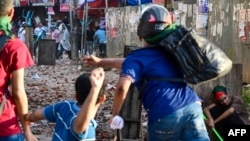
At least 5 people were killed and dozens injured in two separate incidents in Bangladesh as violence continued Tuesday on university campuses in the nation's capital and elsewhere over a government jobs quota system, local media reports said quoting officials.
At least three of the dead were students and one was a pedestrian, the media reports said. Another man who died in Dhaka remained unidentified.
The deaths were reported Tuesday after overnight violence at a public university near Bangladesh's capital, Dhaka. The violence involved members of a pro-government student body and other students, when police fired tear gas and charged the protesters with batons during the clashes, which spread at Jahangir Nagar University in Savar, outside Dhaka, according to students and authorities.
Protesters have been demanding an end to a quota reserved for family members of veterans who fought in Bangladesh's war of independence in 1971, which allows them to take up 30% of governmental jobs.
They argue that quota appointments are discriminatory and should be merit-based. Some said the current system benefits groups supporting Prime Minister Sheikh Hasina. Some Cabinet ministers criticized the protesters, saying they played on students' emotions.
The Bengali-language Prothom Alo daily newspaper reported that one person died in Dhaka and three others, including a pedestrian, were killed after they suffered injuries during violence in Chattogram, a southeastern district, on Tuesday.
Prothom Alo and other media reports also said that a 22-year-old protester died in the northern district of Rangpur.
Details of the casualties could not be confirmed immediately.
While job opportunities have expanded in Bangladesh's private sector, many find government jobs stable and lucrative. Each year, some 3,000 such jobs open up to nearly 400,000 graduates.
Hasina said Tuesday that war veterans — commonly known as "freedom fighters" — should receive the highest respect for their sacrifice in 1971 regardless of their current political ideologies.
"Abandoning the dream of their own life, leaving behind their families, parents and everything, they joined the war with whatever they had," she said during an event at her office in Dhaka.
Protesters gathered in front of the university's official residence of the vice chancellor early Tuesday when violence broke out. Demonstrators accused the Bangladesh Chhatra League, a student wing of Hasina's ruling Awami League party, of attacking their "peaceful protests." According to local media reports, police and the ruling party-backed student wing attacked the protesters.
But Abdullahil Kafi, a senior police official, told the country's leading English-language newspaper Daily Star that they fired tear gas and "blank rounds" as protesters attacked the police. He said up to 15 police officers were injured.
More than 50 people were treated at Enam Medical College Hospital near Jahangir Nagar University as the violence continued for hours, said Ali Bin Solaiman, a medical officer of the hospital. He said at least 30 of them suffered pellet wounds.
On Monday, violence also spread at Dhaka University, the country's leading public university, as clashes gripped the campus in the capital. More than 100 students were injured in the clashes, police said.
On Tuesday, protesters blocked railways and some highways across the country, and in Dhaka, they halted traffic in many areas as they vowed to continue demonstrating until the demands were met.
Local media said police forces were spread across the capital to safeguard the peace.
Swapon, a protester and student at Dhaka University who gave only his first name, said they want the "rational reformation of the quota scheme." He said that after studying for six years, if he can't find a job, "it will cause me and my family to suffer."
Protesters say they are apolitical, but leaders of the ruling parties accused the opposition of using the demonstrations for political gains.
A ruling party-backed student activist, who refused to give his name, told The Associated Press that the protesters with the help of "goons" of the opposition's Bangladesh Nationalist Party and Jamaat-e-Islami party vandalized their rooms at the student dormitories near the Curzon Hall of Dhaka University.
The family-of-the-veterans quota system was halted following a court order after mass student protests in 2018. But last month, Bangladesh's High Court nulled the decision to reinstate the system once more, angering scores of students and triggering protests.
Last week, the Supreme Court suspended the High Court's order for four weeks and the chief justice asked protesting students to return to their classes, saying the court would issue a decision in four weeks.
However, the protests have continued daily, halting traffic in Dhaka.
The quota system also reserves government jobs for women, disabled people and ethnic minority groups, but students have protested against only the veterans system.
Hasina maintained power in an election in January that was again boycotted by the country's main opposition party and its allies due to Hasina's refusal to step down and hand over power to a caretaker government to oversee the election.
Her party favors keeping the quota for the families of the 1971 war heroes after her Awami League party, under the leadership of her father, Sheikh Mujibur Rahman, led the independence war with the help of India. Rahman was assassinated along with most of his family members in a military coup in 1975.
Police open hazing investigation after Dartmouth student found dead
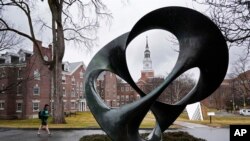
Police have opened a hazing investigation after a Dartmouth College student was found dead in a river in early July.
Police received a tip that hazing was involved, and there was evidence that alcohol might have been involved in the death, USA Today reported. (July 2024)




